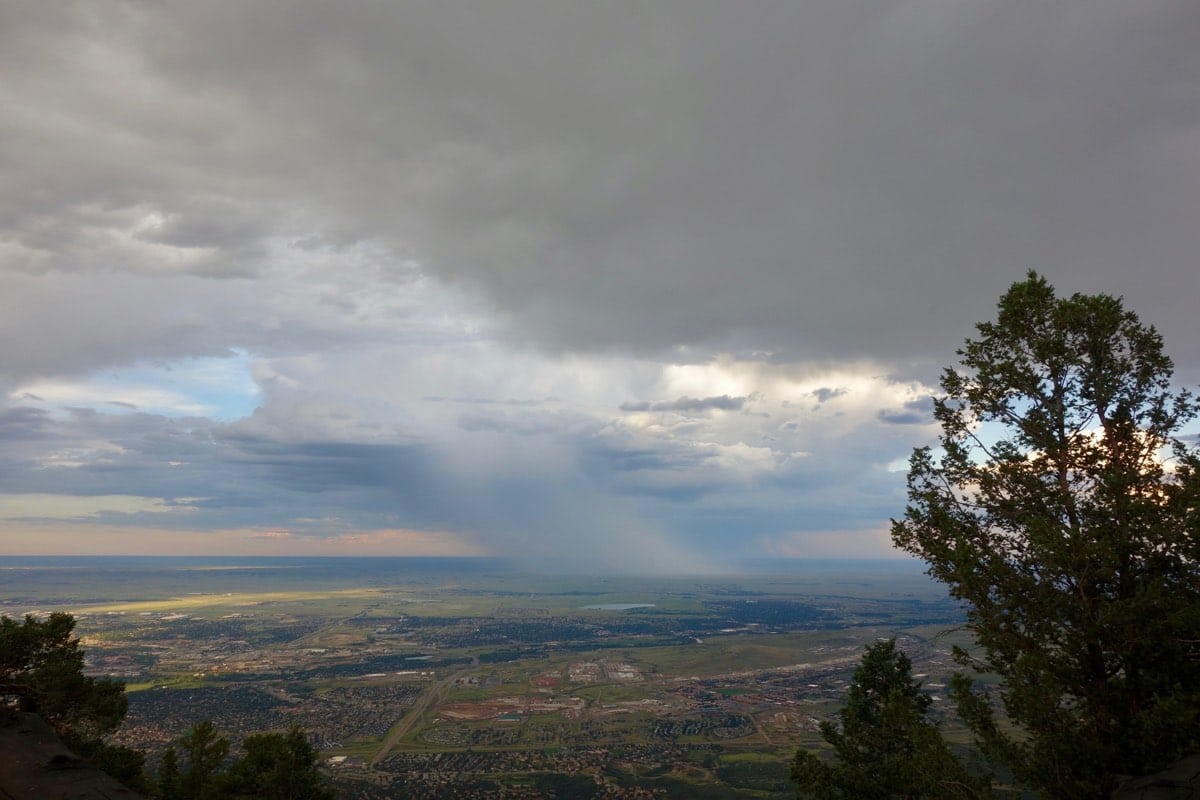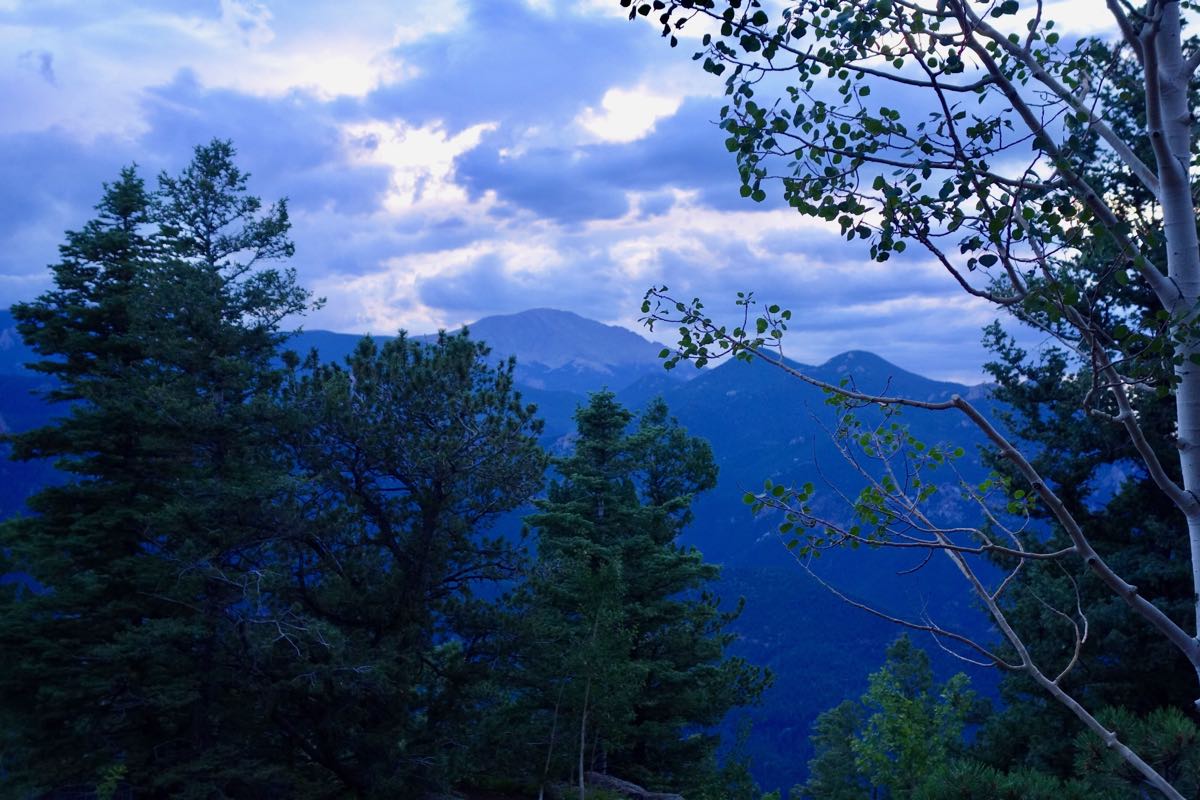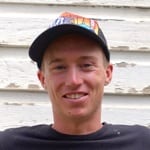The longer the journey, the less weight each moment carries. They are diluted by the economics of scale. When I started out on my bike tour to Colorado Springs, Colorado last Sunday, the experience was supremely anticlimactic. Here’s a journey I’d been planning for weeks, and I was making it highly public as a way to raise money for a cause I believe in. But despite all the online attention my efforts may have attracted, I nevertheless started riding out of Silverton all by myself, under a warm noon sun, passing by tourists looking in shop windows and ATVs cruising the main street. My bike was laden with bags and my head with ideas, but I was by myself, another individual on his inscrutable journey through space, just like everyone else. I passed out of town without fanfare.
By my route, Colorado Springs was 250 miles away, over two passes and many thousands of revolutions of my bike wheels. Those wheels rotated under a mountain sun turning imperceptibly through the sky, altering the shadows that stretched out from the rubber on pavement. I probably weigh 155 pounds, and my bike with bags weighs 40 at the most. Yet those nearly 200 pounds were never connected to the ground by more than a few square inches of rubber. These simple mechanics have the potential to propel me forward almost indefinitely, until the friction of the road rubs through the tire rubber. But then I just get new tires and keep going.
I always try to go forward, but I never go in a straight line. Like the sun above and the wheels below, I turn in my own circles, leaving from home and going outward to a point where my connection to the starting point wears dangerously thin. But travel has a kind of emotional friction, and in time I’m always compelled to return home to recover and replenish the strength that will eventually send me back out. These circles have been large and small, and the toll they take is not always consistent with the physical distance travelled. A 25-mile run or a 250-mile bike ride can be more taxing than a 2,500-mile plane ride. Distance is a mindset.
But on this journey I was at home. The landscape through which I passed was familiar and comfortable. These Colorado roads bend in expected ways, and they commute smells and colors that center me. I know how pine trees smell in the summer heat. I know how aspen leaves flutter in an afternoon sun. And, even this early in August, I wasn’t surprised to find a hint of fall in the air as I slowly awoke in the predawn light of three alpine mornings. That hint is something I know without understanding. It has to do with a smell, but it’s like smelling the air’s temperature rather than its fragrance, and the light is different too, somehow weaker in a way that emphasizes shadows. I thought of shadows a lot as I considered the fundraiser that I’d made of this bike trip. There are many shadows on the environmental movement now, and we seem more to be turning circles than moving forward.
As I pedaled through the mountains, I thought about my cause and the intent behind it. I was going to the Pikes Peak Marathon by bike instead of car in order to raise money to fight climate change. Yet there was no denying certain hypocrisies: my clothes were made with petroleum products in foreign countries; the food I ate was transported from far-distant farms; even the bike I rode, made from steel, was forged by blending iron and coal. These hard truths made my cause feel like riding uphill with the brakes engaged–every foot forward came at a huge cost and even then the direction felt questionable. I camped the second night at 11,000 feet on Monarch Pass below a forest of grey and wilting trees, victims of an explosion of a small species of insect that is ravaging forests from Mexico to Alaska. The trees creaked in the night breeze, and the morning silence was notable for its lack of birdsong. The scale of these problems dilutes the power of individual acts.
And like my bike tires rolling over the road, my connection to the specifics of what I’m talking about is thin. I risk reproach by being public about this, and I can’t answer all the questions people ask of me. But I’m learning by actively engaging with these subjects. And the climate of environmentalism is changing too; we can’t expect everybody to be a climate expert if we want to make real progress on the issue. We need to be able to trust the scientists who study these issues. They are committed to objectivity and spend their careers trying to disprove their own theories. Nevertheless, decades of climate research has demonstrated inarguably that humans have been the cause of the climatic changes occurring all around us. In terms of my continued metaphor, our course as a species has been outward for too long. If we don’t return to our source soon to replenish, our connection with it will snap. There’s no way to return from that. Our source is the natural world that supports us. We must change our society so that the natural world thrives with us, not dies.
As far as my bike ride goes, the little bit of carbon I saved by not driving is better than nothing. A million such sacrifices could make tremendous changes, and I’m determined to do my small part to contribute to that. By the same token, the best thing we can all do is vote for the climate. Not for any one party, but for the representatives who will stand for our planet’s health. Every single vote out of hundreds of millions means something. That’s the message of my fundraiser and of Protect Our Winters, the non-profit I work with to engage with these issues.
On the third day of my ride, I cruised down the east side of Monarch Pass and rode out of the mountains until the prairie stretched endlessly ahead of me. On the east side of the Rocky Mountains, the views are limited only by the Earth’s curvature. But it looks like the land is rising up to the sky. From Colorado Springs the eastern horizon almost appears to be above town, even though it’s hundreds of feet lower. Only once you climb to the top of Pikes Peak and look east can you start to get a true sense of perspective. But I had to wait until the race on Sunday to do that.
I talk about these issues a lot more now than I used to, and I worry that it alienates people who come to this website for news of running. But I do it anyway because running and wild places are inseparable for me. Each can’t exist without the other. So these risks are worth taking if they might make any difference at all to protect the land that gives our community so much. We have a long journey to save our mountains, and each individual act seems to carry no power. It sometimes feels like the whole problem is so large that no salvation is possible. But I believe we’re like people looking outward from the great plains–the perspective is skewed because we’re in the middle of the problem. Only by doing something extreme and climbing out of the situation briefly can we get a glimpse of the hope that’s all around us.
On Wednesday, four days after leaving Silverton, I rode my bike into Colorado Springs. I stopped along the roadside several times to take pictures and savor the moment, and as I moved through the city’s neighborhoods I looked around with a sense of near indignation. I thought, Don’t these people know what I’ve just done? But of course they didn’t. They moved by me on their own inscrutable journeys and nobody’s was better than another’s. When I rolled up to my destination, no one was there to meet me. The finish was as anticlimactic as the start. But I knew what I’d done, and it meant something to me. Then I looked from the house up to the summit of Pikes Peak far above and thought about the race that would come in four days. The mountain seemed so high, nearly insurmountable. And the details of how I might climb to the summit were obscured by the immensity of the view, blended into the grand scale of the peak like the trees blending into the forest.
But the trees were still alive. And the sun was shining down with enough energy to power a thousand Americas. I figured I’d rest up for Sunday and see what the view was like from the top.
[Editor’s Note: In case you didn’t hear, Dakota also won the Pikes Peak Marathon this past weekend. Visit his fundraising campaign website to learn more and support his cause.]
Call for Comments (from Meghan)
- Do you have aspirations of doing more ‘good’ with your running that only spending your recreation time in the outdoors? If so, how do you envision making a contribution to the environments through which you run?
- Do you already take your running to another level beyond yourself? Can you share how?
- What do you think of the idea that a lot of tiny changes can add up to a lot? Does this belief propel you in small, daily actions toward a better environmental future?


